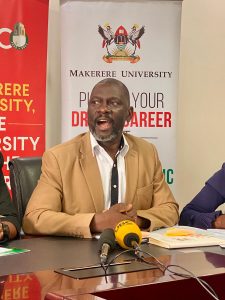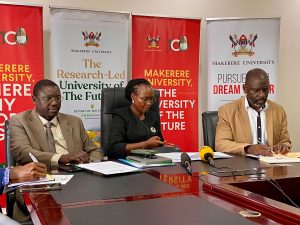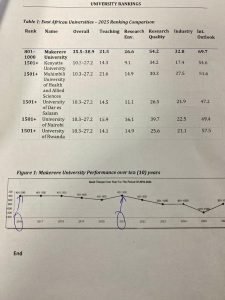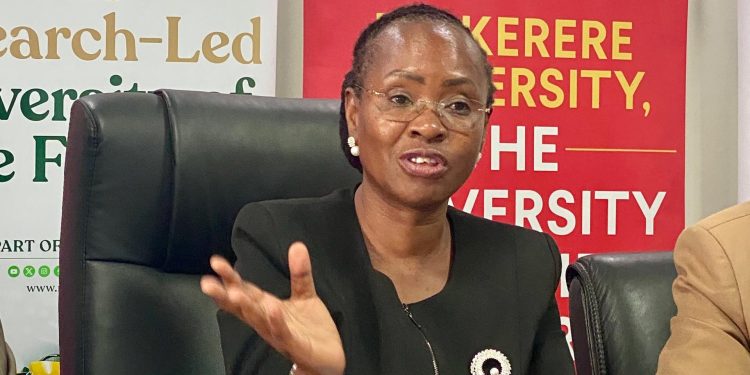Makerere University has once again been named the number one university in East Africa, maintaining its position as the region’s academic leader in the 2026 Times Higher Education (THE) World University Rankings.
The latest rankings placed Makerere within the 801–1000 band globally, reaffirming its position as one of the leading African institutions outside South Africa. The university performed strongly in Research Quality (54.2%) and International Outlook (69.7%).
Its overall score was 37.2, significantly outperforming other East African universities that average scores of 18.8. On the continent, Makerere was ranked 8th in Sub-Saharan Africa.

Resilience and Excellence
Speaking during a press conference at the University’s Main Building, Acting Vice Chancellor, Prof. Sarah Ssali, described the achievement as a testament to Makerere’s resilience, excellence, and continued pursuit of transformative education.
“It gives me great pleasure to share with our stakeholders and the general public that Makerere University has been ranked Number One in the East African region,” said Prof. Ssali. “We continue to uphold our legacy as a leading institution of higher learning, committed to teaching, research, and innovation that drives Africa’s development.”

From Research for Publication to Research for Impact
Assoc. Prof. Robert Wamala, Director of the Directorate of Research and Graduate Training (DRGT), attributed the improved ranking to sustained investment in research infrastructure and innovation.
He highlighted Makerere’s state-of-the-art research laboratories, over 68 research centres of excellence, and a robust human resource base — noting that over 80% of all PhD holders in Uganda are affiliated with Makerere.

“The Government of Uganda now provides up to UGX 30 billion annually for dedicated research funding. This investment has led to tremendous progress in innovation and output,” he said. “We are moving from ‘research for publication’ to research for impact.”
Digital Transformation of Graduate Training
Prof. Julius Kikooma, Director of Graduate Training, said improvements in student experience and academic processes have contributed to Makerere’s strong performance.

“We have digitalised the admissions process to make it faster, more transparent, and more student-friendly,” he explained. “Applicants now apply online, upload documents, and receive individualised feedback, including admission letters.”
He added that research-based programs now accept rolling applications throughout the year and that Makerere has introduced dual-degree programs with partner universities outside Africa — enhancing global exposure and international recognition.

“We have also established a recognition system for outstanding dissertations and theses,” said Prof. Kikooma. “Our goal is to ensure that innovative ideas developed in research are linked with industry to drive real-world change.”
Consistent Growth Across All Indicators
Dr Cyprian Misinde, Director of Quality Assurance, emphasised that the ranking reflects consistent improvement across all key performance metrics since 2016.

“Across Teaching, Research, Research Environment, Industry Income, and International Outlook, Makerere’s performance has been on an upward trajectory,” he said.
He noted that while the university experienced a temporary dip in 2025 due to data capture issues, its 2026 rebound shows “a sustained rise and strong regional leadership.” “If you look across East Africa, no other university is within the 801–1000 band,” Dr Misinde said. “In Southern Africa, we also rank among the top ten universities — a testament to our continued progress.”
A Global Network of Partnerships
Mr Mathias Ssemanda, Manager for International Outlook and Head of Digital Media Communications and Strategy, said Makerere’s global recognition stems from active collaborations with top universities and international organisations.

“Makerere currently has over 725 active Memoranda of Understanding (MOUs) with leading universities worldwide,” he said. “These partnerships are not symbolic — they are active and impactful.”
He cited collaborations with Johns Hopkins University (USA) in health sciences, Michigan State University (USA) and Penn State University (USA) in agriculture, Tsinghua University (China) in ICT, and the Technical University of Munich (Germany) in health sciences.

Student Experience at the Heart of Excellence
Dr Winifred Namuwonge Kabumbuli, Dean of Students, underscored the critical role of student affairs in shaping the university’s performance. “The Student Affairs Office fosters an environment that promotes research, retention, and academic achievement — all of which influence international rankings,” she said.
She explained that Makerere provides accommodation, extracurricular activities, emotional support, and health services to enhance the student experience.

A Decade of Steady Growth
In the 2026 Times Higher Education Rankings for East African universities, Makerere University surpassed other institutions like Kenyatta University (Kenya), the University of Nairobi (Kenya), the University of Dar es Salaam (Tanzania), and the University of Rwanda (Rwanda), all of which are placed in the 1501+ band.
Makerere’s ranking trajectory since 2016 shows resilience and renewal — from a peak in the 401–500 band (2017–2018), through a challenging phase in 2024–2025, to a strong rebound in 2026 (801–1000 band).

The top ten universities in Sub-Saharan Africa region are: University of Cape Town (#1), Stellenbosch University (#2), University of the Witwatersrand (#3), University of Johannesburg (#4), University of KwaZulu-Natal (#5), University of Pretoria (#6), University of the Western Cape (#7), Makerere University (#8), University of Cape Coast (#9), and the University of Ibadan and University of Lagos (tied for #10).
The University of Oxford secured the top spot globally for the tenth year in a row, followed by the University of Cambridge at rank #2. Rounding out the top ten are Harvard University and Stanford University (tied at #5), the California Institute of Technology (#7), Imperial College London (#8), the University of California, Berkeley (#9), and Yale University (#10).









